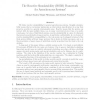Free Online Productivity Tools
i2Speak
i2Symbol
i2OCR
iTex2Img
iWeb2Print
iWeb2Shot
i2Type
iPdf2Split
iPdf2Merge
i2Bopomofo
i2Arabic
i2Style
i2Image
i2PDF
iLatex2Rtf
Sci2ools
153
Voted
IANDC
2007
2007
The reactive simulatability (RSIM) framework for asynchronous systems
We define reactive simulatability for general asynchronous systems. Roughly, simulatability means that a real system implements an ideal system (specification) in a way that preserves security in a general cryptographic sense. Reactive means that the system can interact with its users multiple times, e.g., in many concurrent protocol runs or a multiround game. In terms of distributed systems, reactive simulatability is a type of refinement that preserves particularly strong properties, in particular confidentiality. A core feature of reactive simulatability is composability, i.e., the real system can be plugged in instead of the ideal system within arbitrary larger systems; this is shown in follow-up papers, and so is the preservation of many classes of individual security properties from the ideal to the real systems. A large part of this paper defines a suitable system model. It is based on probabilistic IO automata (PIOA) with two main new features: One is generic distributed ...
Related Content
| Added | 14 Dec 2010 |
| Updated | 14 Dec 2010 |
| Type | Journal |
| Year | 2007 |
| Where | IANDC |
| Authors | Michael Backes, Birgit Pfitzmann, Michael Waidner |
Comments (0)

